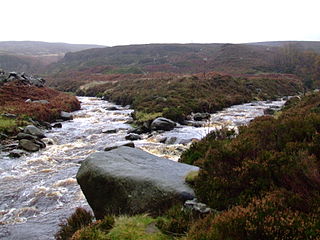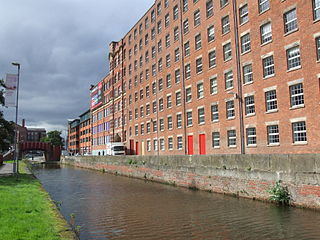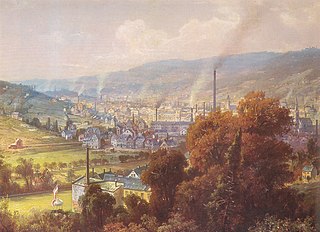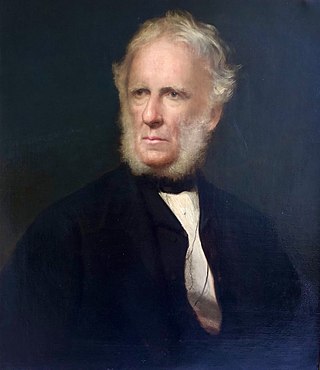Related Research Articles

Glossop is a market town in the borough of High Peak, Derbyshire, England, 15 miles (24 km) east of Manchester, 24 miles (39 km) north-west of Sheffield and 32 miles (51 km) north of Matlock. Near Derbyshire's borders with Cheshire, Greater Manchester, South Yorkshire and West Yorkshire, between 150 and 300 metres above sea level, it is bounded by the Peak District National Park to the south, east and north. In 2021, it had a population of 33,340.

The River Etherow is a river in northern England, and a tributary of the River Goyt. Although now passing through South Yorkshire, Derbyshire and Greater Manchester, it historically formed the ancient county boundary between Cheshire and Derbyshire. The upper valley is known as Longdendale. The river has a watershed of approximately 30 square miles (78 km2), and the area an annual rainfall of 52.5 inches (1,330 mm).

Broadbottom is a village in Tameside, Greater Manchester, England. Historically in Cheshire, it stands on the River Etherow which forms the border with Derbyshire.

A cotton mill is a building that houses spinning or weaving machinery for the production of yarn or cloth from cotton, an important product during the Industrial Revolution in the development of the factory system.

Textile manufacture during the British Industrial Revolution was centred in south Lancashire and the towns on both sides of the Pennines in the United Kingdom. The main drivers of the Industrial Revolution were textile manufacturing, iron founding, steam power, oil drilling, the discovery of electricity and its many industrial applications, the telegraph and many others. Railroads, steamboats, the telegraph and other innovations massively increased worker productivity and raised standards of living by greatly reducing time spent during travel, transportation and communications.

Hadfield is a town in the High Peak of Derbyshire, England, with a population at the 2021 Census of 6,763. It lies on the south side of the River Etherow, near to the border with Greater Manchester, at the western edge of the Peak District close to Glossop. It doubled as the fictional town of Royston Vasey in the BBC comedy series The League of Gentlemen.

The Lancashire Cotton Famine, also known as the Cotton Famine or the Cotton Panic (1861–65), was a depression in the textile industry of North West England, brought about by overproduction in a time of contracting world markets. It coincided with the interruption of baled cotton imports caused by the American Civil War and speculators buying up new stock for storage in the shipping warehouses at the entrepôt. This, as well as causing cotton prices to rise in China, in which trade had been steadily increasing following the Second Opium War and during the ongoing Taiping Rebellion. The increase in cotton prices caused the textile trade to rapidly lose two-thirds of its previous value of exports to China from 1861-1862. The worldwide cotton famine also produced a boom in Cotton production in Egypt and Russian Turkestan.

High Peak is a parliamentary constituency represented in the House of Commons of the UK Parliament since 2019 by Robert Largan, a Conservative.
Sir Samuel Hill Hill-Wood, 1st Baronet was a British businessman, Conservative politician, cricketer and football club chairman.

Trencherfield Mill is a cotton spinning mill standing next to the Leeds and Liverpool Canal in Wigan, Greater Manchester, England. It was built in 1907. It was taken over by the Lancashire Cotton Corporation in the 1930s and passed to Courtaulds in 1964. The mill was driven by a 2,500 hp triple-expansion four-cylinder engine built by J & E Wood of Bolton in 1907. The two halves of the engine were called Rina and Helen. They drove a 26-foot flywheel with 54 ropes at 68 rpm. The engine was stopped in 1968. The mill is now part of the Wigan Pier redevelopment area and is used for other purposes.

Chisworth is a hamlet near Glossop, Derbyshire, England. It is 3 miles (4.8 km) south-west of Glossop town centre, on the south side of the Etherow valley. The parish of Chisworth was formed in 1896, out of the parish of Chisworth and Ludworth. In 1901, it had a population of 409. From 1896 until 1934 it was in the Glossop Rural District, when it was placed with Ludworth into the Chapel en le Frith Rural District. The village possesses a Methodist chapel. The A626 road passes through the hamlet. In June 1930, a local cloudburst caused flooding that killed one man and destroyed equipment at the mills, one of which never reopened.

Whitfield is a hamlet and former parish in Derbyshire, England. It is half a mile (1km) south of Glossop Town Hall, south of Glossop Brook between Bray Clough and Hurst Brook. Whitfield was one of the original townships in the ancient Parish of Glossop. Up to the latter part of the 18th century the hamlet was devoted mostly to agriculture with an area of 2,608 statute acres. The area rises from about 169m to about 266m above mean sea level.
Francis James Sumner was a Roman Catholic mill owner in Glossop. Sumner built a large business and served as Mayor of Glossop, and Deputy Lieutenant and High Sheriff of Derbyshire.

Edmund Potter (1802–1883) was a Manchester industrialist and MP and grandfather to Beatrix Potter.

Coppull Mill is a former cotton spinning mill in Coppull, Chorley, Lancashire. It was opened in 1906 by the Coppull Ring Spinning Co, followed by its sister mill, Mavis Mill in 1908. Together they employed 700 workers. The mill was taken over by the Lancashire Cotton Corporation in 1941 and passed to Courtaulds in 1964. The building is a Grade II listed building and is now used as an enterprise centre. This was a ring mill. It was driven by a 1600 hp triple-expansion four-cylinder engine by J & E Wood built in 1906. Its 26-foot (7.9 m) flywheel operated at 68 rpm and ran 36 ropes.

Mavis Mill was a cotton spinning mill in Coppull, Chorley, Lancashire

Stalybridge Mill, Stalybridge is a cotton spinning mill in Stalybridge, Tameside, Greater Manchester, England. It was built in 1868, and the engine reconfigured in around 1925. It was taken over by the Lancashire Cotton Corporation in the 1930s and passed to Courtaulds in 1964.

Royd Mill, Oldham was a cotton spinning mill in Hollinwood, Oldham, Greater Manchester, England. It was built in 1907, and extended in 1912 and 1924. It was taken over by the Lancashire Cotton Corporation in the 1930s and passed to Courtaulds in 1964. Production finished in 1981. The mill was demolished in 2015 to make way for a "DifRent" housing scheme.
The Hyde and District Weavers', Winders', Warpers' and Doublers' Association was a trade union representing workers in the cotton industry around Hyde, then in Cheshire and Derbyshire in England.
References
- ↑ Birch, A.H. (1959). "2". Small Town Politics, A Study of Political Life in Glossop . Oxford University Press. pp. 8–38.
- ↑ Quayle, Tom (2006). The Cotton Industry in Longdendale and Glossopdale. Stroud, Gloucestershire: Tempus. p. 126.